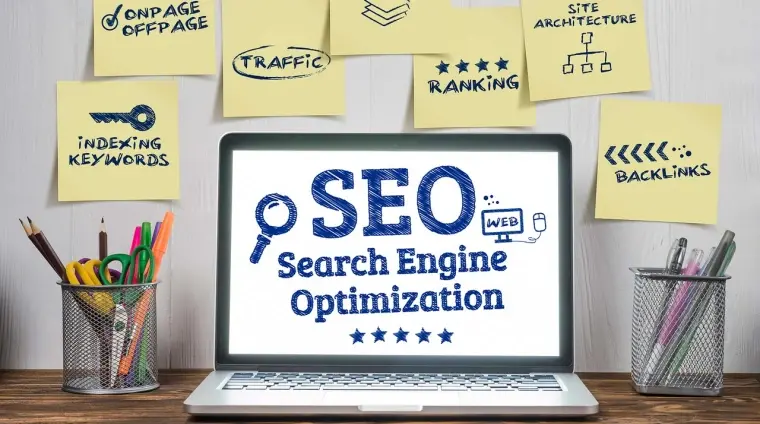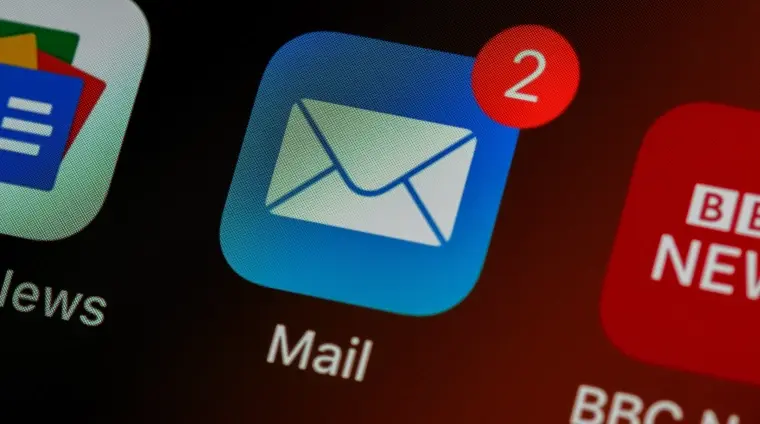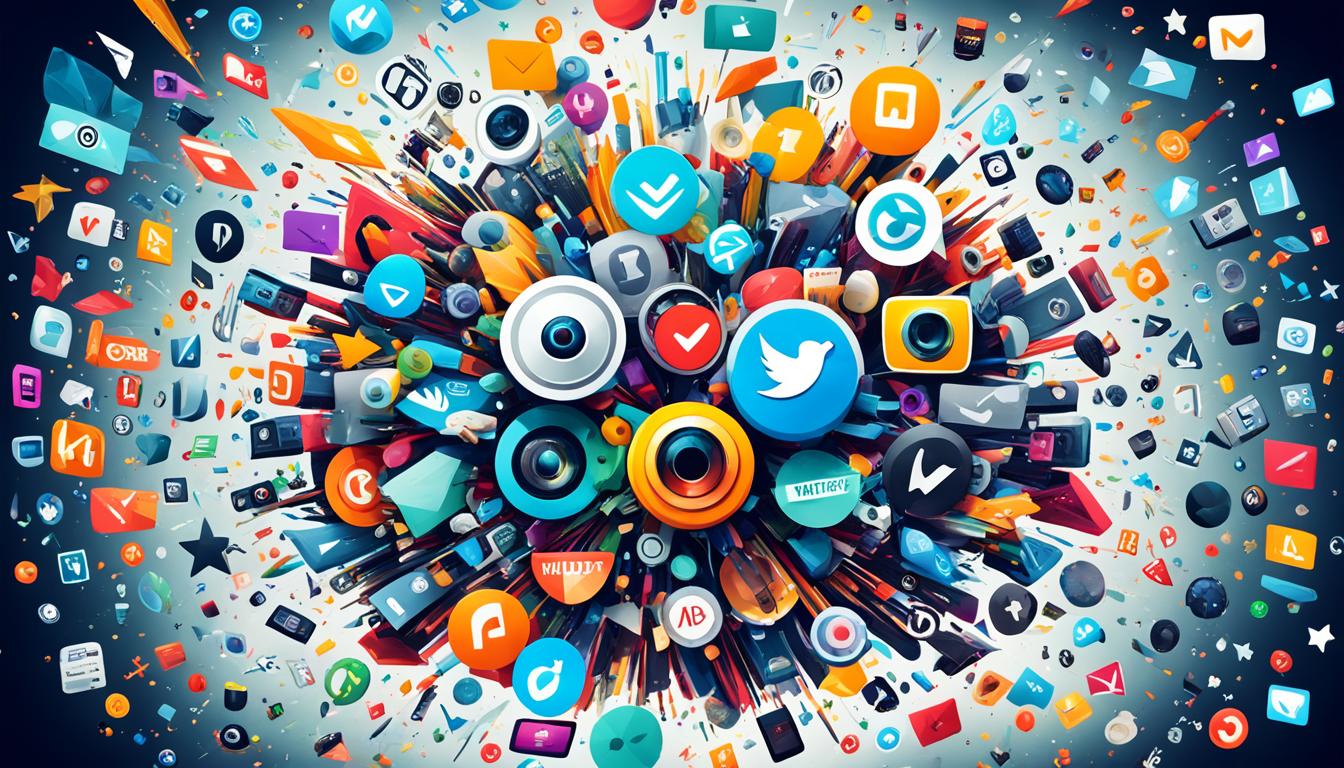Now, in our fast-changing digital world, businesses are challenged to catch their audience’s interest. They need to share messages that strike a chord. Interestingly, 88% of B2B and B2C marketers choose content marketing as a key strategy. This shows how crucial a strong content plan is for staying ahead.
Artificial Intelligence (AI) is changing the game in content marketing. It helps make content that’s tailored, efficient, and backed by data. This means better engagement and impressive outcomes. Our article will go in-depth on how AI affects content marketing, pointing out its perks, how to use it, and ethical issues. It’s a must-read for anyone leading a business, giving them the info and tools to use AI for creating messages that truly connect with their audience.
Key Takeaways
- Artificial Intelligence (AI) has transformed the content marketing landscape, enabling businesses to create personalized, efficient, and data-driven content.
- Leveraging AI in content marketing offers benefits such as personalization at scale, increased efficiency and scalability, and data-driven insights.
- Implementing AI in content marketing strategy involves assessing your current approach, integrating AI tools, and continuously monitoring and optimizing your efforts.
- Ethical considerations, such as the ethical use of data, maintaining authenticity, and ensuring transparency, are crucial when incorporating AI in content marketing.
- Crafting resonant messages that resonate with your audience requires understanding customer pain points, tailoring content to individual preferences, and evoking emotional responses.
Understanding AI in Content Marketing
The use of artificial intelligence (AI) is changing how companies tailor their content. It lets marketers dive deep into data, spotting trends and predicting what users will want. This means smarter, more focused content that really speaks to people.
The Power of AI in Creating Personalized Content
Thanks to AI, we can give each customer a unique experience. This personalized content not only meets their needs but also strengthens their bond with a brand. AI sifts through heaps of data to uncover what makes each person tick. Then, it helps create content that hits home.
Natural Language Processing: A Key to Understanding Audience Needs
Natural language processing (NLP) plays a key role in AI content marketing. NLP lets AI understand the quirks of human language, making content more relatable. It helps marketers talk in a way that really draws people in. This can lead to more clicks, likes, and sales.
Predictive Analytics: Anticipating Future Trends
AI doesn’t just look at the past; it also sees the future. With predictive analytics, it predicts what will catch a customer’s eye next. By analyzing tons of data, AI models pick up on early signs of trends. This helps businesses stay one step ahead, pleasing their audience today and tomorrow.
Benefits of AI in Content Marketing
The use of AI in content marketing marks a new chapter in how we connect with people. It allows for creating personalized content on a grand scale. This custom content can reach every part of your audience in a way that feels personal. It boosts brand loyalty and engagement deeply.
Efficiency and Scalability
AI-powered content marketing makes work faster and easier. It changes long tasks into quick wins. With this power, businesses save both time and money. Marketers can then focus on the big picture, not just making content.
Data-Driven Insights
In addition to making content more personal and efficient, AI in content marketing also offers data-driven insights. It quickly sifts through data to show the best moves. This helps make marketing more successful over time. It’s a big win for finding what your audience loves.
Implementing AI in Your Content Strategy
As the digital world changes, companies are using Artificial Intelligence (AI) more. They use it to make their content marketing better. To use AI well, you need to look at your current strategy, pick the right AI tools, and manage your data. You also must keep checking and improving.
Assessing Your Current Content Marketing Approach
Start by looking at how you currently do content marketing. See how your content is doing and where AI could make it better. Figure out the problems AI can solve. This will show you how to smoothly bring AI into your strategy.
Integrating AI Tools
After that, choose AI tools that fit your goals. You have lots of options, from making content to learning about your audience. Pick tools that work with what you already have and meet your needs well.
Training and Resources
Teach your team how to use AI in marketing. Make sure they know how to use these tools effectively. This will help them get the most out of AI for your content.
Data Management
Good data management is key for AI to work in your content strategy. Have a solid system to collect and analyze data. This makes your content smarter and more targeted.
Continuous Monitoring and Optimization
Using AI well is a never-ending process. Keep an eye on how your AI-driven content is doing. Use the data to make your content even better for your audience.
Ethical Considerations and Best Practices
AI in content marketing is growing fast. So, it’s key to look at ethics. Keeping trust and staying real in your brand’s messages is vital now. People are watching closely.
Ethical Use of Data
Using data ethically matters a lot in AI content marketing. We must protect data privacy and get clear consent. Being open about how you collect and use data helps avoid trust issues and legal problems. Marketers need to follow rules like the GDPR or CCPA to keep their audience’s privacy safe.
Maintaining Authenticity
Keeping your brand true in the AI age is very important. AI content should match your brand’s voice and values. If AI content seems real but isn’t, trust can be lost. Marketers should be honest and real in their AI content plans.
Transparency in AI Usage
Being open about using AI is key in ethical marketing. People should know when AI creates or chooses content. This openness builds trust and shows your commitment to being real. Explaining how AI works also helps people see its limits and any biases, making them more understanding and involved.
Building Blocks of Hyper-Personalization
Hyper-personalization uses artificial intelligence (AI) and machine learning to study massive data sets. It predicts what consumers will like. This approach tailors experiences greatly. It focuses on three main stages: customer data collection, AI and machine learning, and customer segmentation.
Customer Data Collection
It gathers all types of customer information. This includes who they are, what they do, and what they like. By knowing about their purchases, web surfing, location, and more, businesses understand their customers better.
AI and Machine Learning
AI and machine learning processes huge amounts of customer data. They find insights that help predict what customers want and where trends are going. This allows companies to tailor things just for individuals. They use smart analytics to make customers feel special, strengthening loyalty and connections.
Customer Segmentation
Splitting customers into groups is key in hyper-personalization. By doing this, businesses aim their messages more directly. Each group gets targeted content and campaigns. This makes customers happier and more loyal.
Using lots of data, smart insights, and precise segmentation creates amazing hyper-personalized experiences. They draw customers in and keep them interested.
Crafting Resonant Messages
In today’s world, making messages that truly connect with people is key. You need to know what your audience cares about. You should make them feel like you get them. And you want to leave them with feelings that last.
Understanding Customer Pain Points
To start, understand what your customers need and want. Look into what makes them tick. This helps you find the right words that show you can help. It makes your brand stand out as the one that understands and cares for them.
Tailoring Content to Individual Preferences
Making messages that are hyper-personal works wonders. By using what you know about your customers, you can speak right to them. This deep level of personalization makes people feel you’re talking directly to them. It builds strong, personal ties between them and your brand.
Emotional Resonance
Building deep connections is not just about what you say. It’s about stirring something inside your audience. Adding stories and showing you share their values can be powerful. It turns customers into loyal fans who feel a strong bond with your brand.

Hyper-Personalization Strategies
Businesses aim to make deep connections with customers. They use hyper-personalization in content marketing. This method uses advanced data analytics and AI. It lets companies create experiences that match what each customer likes.
Email Marketing
Customized email campaigns are a big part of hyper-personalization. Companies divide their email lists and send targeted content. This method grabs the audience’s attention by being very relevant to them. It also boost conversions and customer loyalty.
Social Media Marketing
Social media is a great place for hyper-personalization. With data-driven insights, businesses can tailor their content to meet specific customer needs. This includes suggesting products that are likely to interest them. These efforts help companies connect more deeply with customers.
Content Marketing
In today’s fast-changing digital world, content marketing stands out. It connects businesses to the people they want to reach. This is done by sharing messages that customers love. When companies do this, they become known and trusted. They also build strong customer relationships.
From stories that inspire to offering real value, content marketing shines in many ways. It keeps both new and old customers interested.
Crafting Compelling Messages
The key to great content marketing is in the messages you send. You need to understand your audience’s needs and dreams. Then, you can create messages that make a real connection. This builds trust and loyalty.
The Power of Storytelling
Storytelling is at the heart of great content marketing. It lets businesses show their human side and connect emotionally with people. Through stories, you can share your brand’s beliefs and unique qualities. This sets you apart from others and sticks in people’s memories.
Providing Value to Your Audience
Making content that matters is crucial. This could be something that teaches, inspires, or simply entertains. Your goal is to make your audience’s lives better. This way, your brand becomes a go-to source for them. Consistently offering this kind of value can grow your fan base and improve your business.
The Role of Personal Branding
Creating a personal brand is very important in sending effective messages. It shows the real you, including what you stand for and what you’re good at. This builds a solid foundation of trust and credibility. So, your voice stands out and touches the people you want to reach, making them trust and follow you.
Developing an Authentic Personal Brand
To really stand out, you have to be true to yourself. This means not being like anyone else but being the best version of you. Identify what makes you special, and share it with the world.
Once you pick your USP (unique selling point), keep it consistent in everything you do. This way, your message speaks directly to those who get you. Your audience feels like you’re talking just to them, meeting their needs and desires.
Building Credibility and Trust
Having a solid personal brand does more than just setting you apart. It also builds credibility and trust. By being open about what you believe and sharing your expertise, you become a go-to person in your field.
This makes people more than just followers; they become true fans. They trust and recommend you, creating a loyal community around your brand.

The Right Method™: Unlocking Expertise
The Right Method™ is your go-to for creating messages that captivate. They’re a leading full-service creative team, with 22 Emmy awards. They specialize in helping business leaders and entrepreneurs tell powerful stories.
Strategies for Crafting Magnetic Messages
Their approach is all about reaching your audience effectively. The Right Method™ uses a mix of data and emotive stories. This way, your messages speak directly to your customers.
Leveraging Emmy Award-Winning Expertise
What makes The Right Method™ unique is their expert team. They’re Emmy winners with deep insights and skills. Need to boost your brand’s appeal, engage your audience, or make sales? They’ve got you covered with their special magnetic messages.
Measuring Success in Content Marketing
It’s key to measure how well your content marketing is doing. This helps you keep getting better. You should watch the results closely, look at the data, and tweak your methods. This way, you make sure your content really speaks to your audience and gets good results.
Key Performance Indicators
Measuring success in content marketing means looking at many different factors. This includes things like views, impressions, and the click-through-rate (CTR). You also want to see how many leads your content is bringing in, how many people sign up for your emails, and how much your customers are worth. Don’t forget to keep an eye on where your content shows up in search results, and what sites link back to you.
Analyzing Data and Insights
Using insights from data is vital in content marketing. Tools such as Google Analytics, Google Search Console, and more, offer a ton of info. You can see where your traffic is coming from, what users do on your site, and what content they like most. By studying this data, you figure out what content works best, what your audience prefers, and how to make your content even better.
Continuous Optimization
Getting content marketing right is a process of constant improvement. Always keep an eye on your KPIs. Tweak your strategy based on what the data tells you. By making ongoing improvements, you craft content that truly meets your audience’s needs. You might change up your content types, your timing for publishing, or focus on new keywords. This can boost your visibility in searches and bring you better outcomes.
The Future of Content Marketing
The digital world keeps changing. This change shapes the future of content marketing. To lead, businesses must be quick to adapt and use new tools. They must create content that grabs and keeps the audience’s attention.
Emerging Technologies
Technology is key to the future of content marketing. By 2024, AI tools, like Grammarly and DeepL, are very popular. They are making a big difference. For example, OpenAI’s ChatGPT can boost the value of content by up to 200%. These technologies are changing how content is made and used.
Evolving Consumer Behavior
Customers’ likes and habits are always changing. By 2024, voice search is very common in the US. People use it a lot to find local businesses. Also, there are more than 5 million podcasts on Spotify. This shows how much people like to listen to podcasts. Marketers need to adjust their strategies for these new ways of consuming content.
Staying Ahead of the Curve
To lead in content marketing, companies need to be innovative and flexible. Using advanced analytics and reaching people through different channels are important. They should also focus on telling stories well. In 2024, interactive content, like quizzes and live streaming, will be vital in engaging the audience. Personalized content, with AI-driven suggestions, will help companies build lasting relationships with their customers.
Conclusion
AI is changing how businesses talk to their audiences. It offers more personalized messages and uses data to improve. This helps companies connect better with people, leading to more success in their marketing efforts.
Today’s businesses need to keep up with new tech and what customers want. They should always make their content better. This means offering useful and real content to win people’s trust and be seen as a leader.
In the digital world, AI, personalization, and data are the future of marketing. Using these tools, businesses can make their content more interesting. They can form stronger bonds with their audience. Success means making messages that really speak to people.
FAQ
What is the role of AI in content marketing?
How does AI enhance personalization in content marketing?
What are the key ethical considerations when incorporating AI in content marketing?
How can businesses implement AI-driven content marketing strategies effectively?
What is the role of personal branding in crafting compelling messages?
How can businesses measure the success of their content marketing efforts?
What are the future trends in content marketing?
Source Links
- https://www.digitalauthority.me/resources/hyper-personalization-messages-resonate/
- https://contenthacker.com/how-to-create-content-marketing-strategy/
- https://rockcontent.com/blog/ai-content-marketing/
- https://mention.com/en/blog/ultimate-generative-ai-guide-content-marketing/
- https://zapier.com/blog/content-marketing-ai/
- https://www.forbes.com/sites/forbescommunicationscouncil/2023/12/22/artificial-intelligence-and-the-future-of-content-marketing/
- https://www.cloudways.com/blog/ai-content-marketing/
- https://www.jasper.ai/blog/ai-content-strategy
- https://www.semrush.com/goodcontent/content-marketing-blog/ai-content-marketing/
- https://izea.com/resources/ethical-content-marketing/
- https://www.linkedin.com/pulse/ethical-considerations-content-marketing-stanventures-oxjmc
- https://www.ibm.com/blogs/think/uk-en/hyper-personalisation-the-next-frontier-in-digital-transformation/
- https://www.bcg.com/publications/2018/building-blocks-personalization
- https://www.zuora.com/guides/the-art-of-engaging-content-crafting-experiences-that-resonate-with-your-audience/
- https://www.boomer.com/post/crafting-marketing-mastery-key-ingredients-for-resonance-and-success
- https://www.forbes.com/sites/forbesbusinesscouncil/2024/02/23/driving-performance-with-content-hyper-personalization-through-ai-and-llms/
- https://www.sitecore.com/resources/omnichannel-personalization/what-is-hyper-personalization
- https://contentmarketinginstitute.com/what-is-content-marketing/
- https://mailchimp.com/marketing-glossary/content-marketing/
- https://abmatic.ai/blog/role-of-personal-branding-in-personalized-marketing
- https://hingemarketing.com/blog/story/personal-branding-strategy-a-roadmap-for-professionals-experts-and-executives
- https://www.socialmediatoday.com/news/how-to-build-a-personal-brand-with-content-marketing/526898/
- https://www.linkedin.com/pulse/ten-content-marketing-hacks-drive-better-customer-experience-hyken/
- https://optinmonster.com/how-to-create-a-successful-content-marketing-strategy-in-8-simple-steps/
- https://www.execo.com/blog/unlocking-content-maps-power
- https://www.semrush.com/blog/content-marketing-metrics/
- https://blog.hubspot.com/marketing/content-marketing-metrics
- https://contentoo.com/blog/content-marketing-trends/
- https://www.linkedin.com/pulse/future-content-marketing-trends-tactics-2024-trishla-magoo-begvc
- https://learn.saylor.org/mod/book/view.php?id=53955&chapterid=38931
- https://surferseo.com/blog/content-marketing-important/















